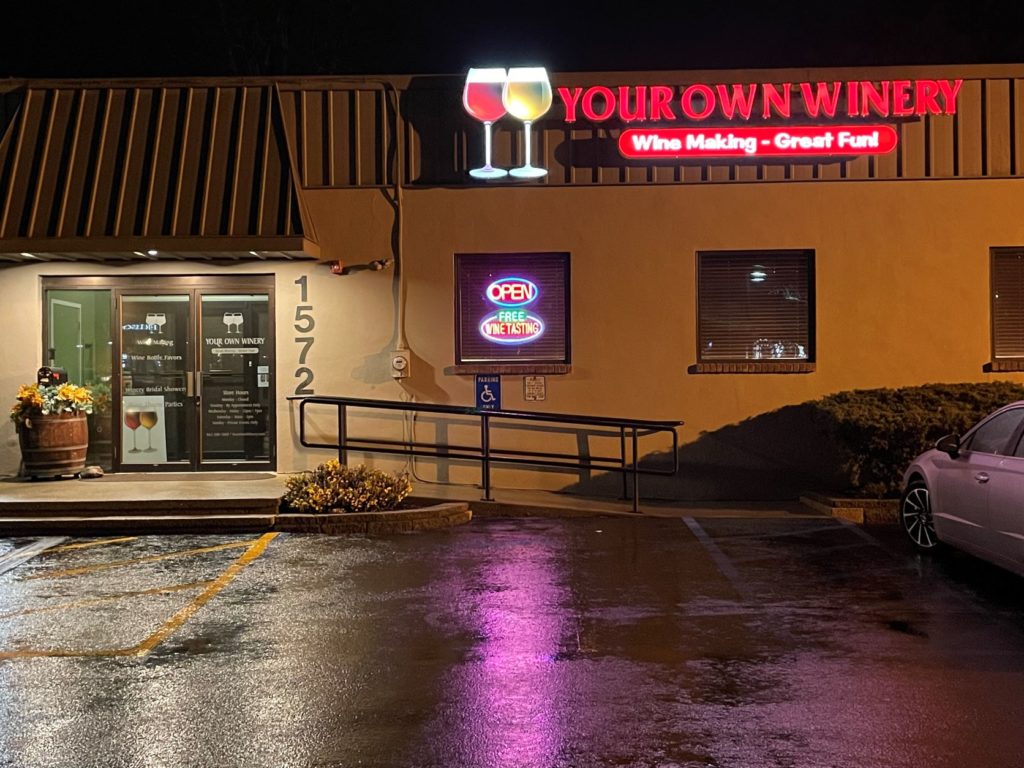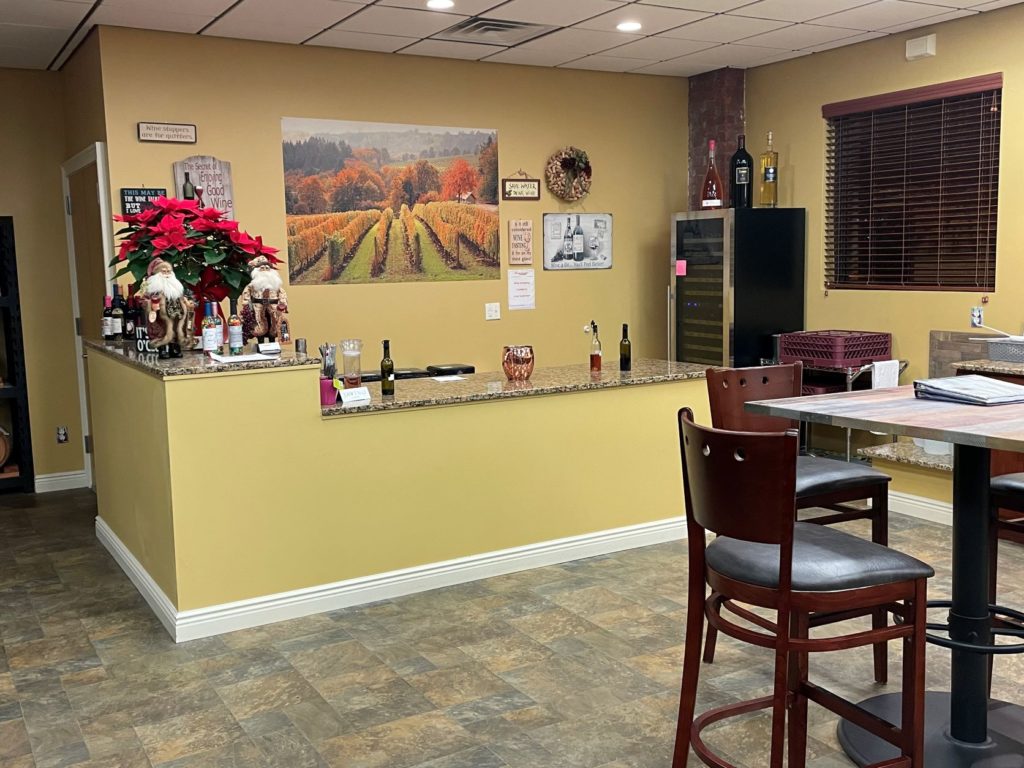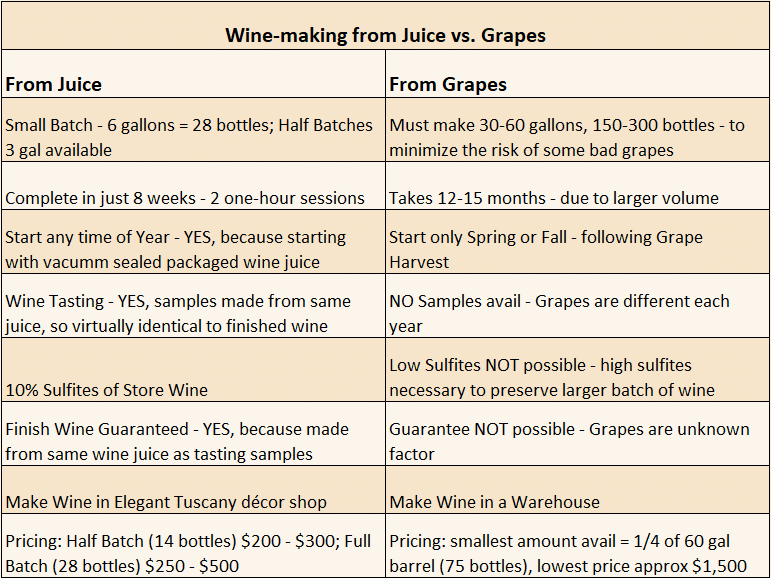Start Wine Making business
Interested in starting your own wine making business?
We can help with expert guidance. This is NOT a franchise offer – there is NO up-front buy-in cost. Just great experienced advice and ongoing support on a consulting basis, as much or little as you need. Plus, if you hire us to handle the promotion and marketing of your new wine-making business for a modest monthly consulting fee, we will give you the right to use our highly recognized brand “Your Own Winery”.
Your Own Winery is a retail business where wine lovers come to personally make “Their Own Wine”. We opened our doors for business in Feb 2013 in Morris County, New Jersey. We’ve been open for 11 years, and suffice to say the knowledge and experience we have gained over those years is invaluable. We are a New Jersey Alcoholic Beverage Commission licensed “Wine-Making School”. It is important to know, each state’s regulations and licensing requirements for retail wine-making business are different, and these regulations within each state are also different than for a commercial winery (commercial wine-making business). So it is important to research and understand the regulations and licensing requirements for retail wine-making business in your state.


Your Own Winery is not like most other wine-making businesses out there, and there are not many. Most other retail wine-making businesses we know of start the wine-making process with freshly harvested wine grapes. The first glitch with this, wine-makers can only start a new wine following the fall grape harvest in the major northern hemisphere wine-growing regions (US, Canada, Italy and France), and in the spring following the harvest in the southern hemisphere wine-growing regions (Australia, Argentina, Chile and South Africa). The second and larger issue for a retail wine-making business starting from grapes, it is not possible for customers to do a wine tasting in order to decide which wine they would like to make. Because, each year’s wine grape crop is different, so each year’s wine from the same type of grape, say Cabernet Sauvignon, will be different, hence these businesses cannot sample for the customers Cabernet Sauvignon made from fall 2017 harvested grapes and say that Cabernet made from fall 2018 harvested grapes will taste same or even close.
Wine making from Juice vs. Grapes
Our wine making starts with top quality wine juices. Wine-making kits as they are commonly known. Our wine kit suppliers are some of the largest buyers of wine grape crop in the world; either wine grape crop which a commercial vineyard (which only grow grapes, but don’t make their own wine – not all vineyards are also wineries) grows to sell straight off, or wineries which grow their own grapes but have excess crop which they do not intend to use to make their own branded wines. First, our suppliers have expert wine-makers who travel the world to purchase wine grape crop, and only purchase grape crop of a quality they are as certain as they can be will result in a great finished wine. To emphasize this point there are times when a specific wine juice kit has been available for several years and always produced outstanding finished wine from personal wine-making, but then that wine juice kit become unavailable because the grape crop was just not up to our suppliers’ quality standards. This occurred most recently with our Italian Burnello, perhaps our very best wine for personal wine-making. Italian Burnello had been available for 7 years without interruption, then was not available for nearly 2 years, and now is available again but only as a Limited Release because a quality grape crop was very limited. Once our suppliers acquire the quality grape crop, they perform the grape crush in large volume, resulting in 1,000’s of gallons of wine juice. They then package the wine juice in vacuum sealed bags in a volume to make a 6 gallon batch of wine, and box it up with the necessary wine-making ingredients for personal wine-making, the wine-making kits, which have a 12-18 month shelf life. At any time, we have over 100 wine-making kits in inventory, so our wine-making customers can start their wine any time of year.
There are a large number of differences between wine making from Juice vs. Grapes.

Wine making at a shop vs. Wine making at home
You might be asking, why would someone pay to make wine at a retail wine-making business, rather than making wine at home with the small batch (6 gallon) wine making kits mentioned above, saving a money by doing so. There are several excellent reasons not to make wine at home:
- Fermentation. The equipment needed to make wine even starting with juice cannot be overstated. Fermentation buckets (approx. 7 gallons in size) with lids and CO2 release bubblers. Carboys (which are similar to 5 gallon plastic water jugs, but 6 gallons in size) with air tight seal caps. Tools, including syphons, large spoons, degassing whips, and hydrometers to measure sugar levels as the wine moves through fermentation. This is the equipment necessary just to get through fermentation. Not to mention all this equipment must be thoroughly sterilized before usage each time, which is most commonly done with a 2 step process first using a sanitizing solution and second a sterilizing solution of critic acid and sulfite, supplies which are a must for successful wine making.
- Filtering. Once fermentation is finished, the next step is getting the wine ready for bottling. This is a fairly big one. As a result of the fermentation process, there will be lots of organic matter left in the wine, commonly known as sediment. So unless someone is OK drinking wine with lots of sediment, the sediment must be removed. At Your Own Winery, we accomplish this by use of a commercial level wine filter – the Super Jet Wine Filter – retail cost about $400. A cost which does not include the filter pads, 3 pads needed for each wine, which cost about $1 each. The alternative to using an expensive filter such as this is “racking” the wine multiple times (4 – 6 times) to remove the sediments. “Racking the wine” is the process of carefully syphoning the wine out of its carboy just above the bottom, leaving sediments behind at the bottom of the carboy. One such racking is never 100% efficient at removing all the sediment, so this must be done several times, allowing the wine to resettle between rackings so the remaining sediments fall to the bottom or the carboy.
- Botting. Once all the sediment has been removed from the wine and its ready for bottling, a few more pieces of equipment and some supplies are needed. Let’s start with the most obvious – the Wine Bottles themselves. Unless you happen to live close to a retail (not wholesale only) wine making supply store, wine bottles must be purchased online with a hefty shipping cost. With the wine bottles in hand, even if they are NEW bottles, best practice is that the inside of the wine bottles should be sterilized using the critic acid/sulfite solution, to 100% eliminate any possibility of bacteria inside the bottle which will cause the wine to spoil very quickly. We use a bottle rinsing tree for this step. Once the bottles have been sterilized, the easiest non-commercial way to fill the bottles from their 6 gallon carboy is with a syphon equipped with a spring activated bottling tool. Once the bottles are filled with wine, naturally they must be corked, for which obviously a supply of corks is needed. Then some type of bottle corker is needed, to press the cork into the bottle. We use a floor model corking machine. While there are less expensive table top models available, they are not all that easy to use. Then comes the foil bottle tops, again a supply of those is needed, and a piece of equipment to heat seal the foil tops, for which we use a table top model. Last be not least, bottle labels. Some wine-making kits come with a supply of generic labels, but after everything to make a batch of wine, creating custom bottle labels is almost a necessity to customize and complete your efforts. Thus needing a label supply, label formatting software, and color printer.
- Challenges. A couple of challenges must be mentioned about making wine at home. First, the 7 gallon fermentation buckets and 6 gallon carboys are not small in size, they do not easily fit into a standard home kitchen sink for washing without resulting in a good wet shower for the surrounding area. And there will be lots of washing of buckets and carboys. We have and use a 3-bay commercial kitchen sink for this task. Then there is the potential of fruit flies. Fruit flies are very tiny flying bugs which are attracted to sweet smells – such as fermenting wine. If not very careful to clean-up or seal-off all sweet smells, just wait for fruit flies by the 1,000s. And if they do find their way inside a home, it is a fair size nightmare to eliminate them.
Wine making at a Shop, such as Your Own Winery, puts all of the above in the hands of the shop and its staff – while the personal wine-maker gets to just enjoy the experience of wine-making.
Related Wine-making Products
Wine Bottle Wedding Favors
Your Own Winery opened in 2013 with personal wine-making being its only product, albeit over 50 wines available for personal wine-making. Within a short period of time we learned of several related and extremely attractive products we could offer. This list must start with Wine Bottle Wedding Favors. We were blown away with the appeal and demand for custom labeled Wine Wedding Favors. Engaged couples can select any of the 50+ wines offered and customize the bottle with a label featuring a favorite image, such as their engagement photo. Your Own Winery has become THE SOURCE in the Northeast for the very best Wine Wedding Favors, with over 750 soon-to-be-married couples selecting our wine favors as their wedding favor of choice, coming from as far away as Rhode Island and Kentucky for our wine wedding favors.
Winery Shop Parties & Events
Your Own Winery is a 2,000 sf space, elegantly designed in a Tuscany décor in a warm inviting color palette, cherry wood cabinets, granite counter tops, with wine art adorning every wall. Our winery shop has been recognized as a premier venue for parties and celebrations of every type. Top of that list, Bridal Showers, by far our most popular event. We have hosted over 75 Winery Bridal Showers, and all have been a smashing success. In addition to our elegant space, our winery shop is exclusive to party guests (no other customers), the host can decorate the space for the party with 1 hour advance access, and the big one – all party guests bottle, cork and label their own wine bottle party favor with a custom label designed for the event. After bridal showers, we have hosted dozens of Wine Theme Parties for special birthday, anniversary and retirement celebrations, we’ve also hosted several Baby Showers and Revel Parties, plus Company Events for employees and customers, as well as Team-building.
Start a Wine Making business
Starting any new retail business is a very large undertaking. Paul and Michele Crecca, founders and owners of Your Own Winery, have all the knowledge and experience needed to start and build a successful personal wine making business.
Before going any further, take a peek at our 5-Star Yelp Reviews and 5-Star Reviews on Google, to prove we know how to build and operate a successful wine making business.
Make no mistake, there are a huge number of things to consider in starting a personal wine making business, so don’t make a huge mistake – engage with us to avoid all the costly mistakes we made when starting up Your Own Winery in 2013. Fortunately for you, we offer increasing levels of advice and knowledge as you consider opening a wine waking business.
- Phase 1 – Business Formation. These first questions must be answered in order to develop an initial picture and plan for your wine making business, and will save you thousands of dollars if you decide to move forward. Fee for Phase 1 is $1,000. For this fee, you will receive the initial 5 considerations related to opening a personal wine making business, with 30 days of email based support for Q&A as you answer these phase 1 matters.
- Phase 2 – Wine making Shop Setup. Following business format decisions made in Phase 1, this phase will provide you with a complete and comprehensive list of the equipment, tools and supplies which must be purchased for day to day operations in a wine making business. Also, we will provide critical guidance and consultation on the physical setup/construction of your wine making shop. Fee for Phase 2 is $2,500. At the end of Phase 2, you will have a good estimate of the total upfront dollar investment to be made before opening the doors of your wine making business.
- Phase 3 – Operations & Marketing/Promotion. If after Phase 2 you remain interested in pushing forward, but before any large dollar commitment is necessary, these phase 3 considerations are very important so you gain a clear understanding of what owning and operating a personal wine making business will involve. Namely, what must be done in your wine making shop on a day to day basis in order to service your wine making customers, and also what must be done to market and promote your wine making business in order to be successful by attracting customers. Fee for Phase 3 is $3,500. For this fee, you will receive a comprehensive outline detailing the day to day operations of a personal wine making business, the marketing strategies and tactics which must be performed upon starting up the business and then on a ongoing basis, 60 minutes of live consulting/Q&A via Zoom, and 30 days of email support.
- Special note on Marketing: Of all the experienced advice we can offer, the Marketing/Promotion knowledge we can provide is in our view the most valuable. Understand that you will not be opening a business which people immediately recognize such a pizza shop or a nail salon, or understand exactly what personal wine making entails, such as a car wash. With a personal wine making business you cannot expect very many “walk-in” customers, marketing and promotion must attract them to your business. Over the years, we have tried almost every type of marketing and promotion except TV advertising which is far too expensive, and frankly have burned 10s of thousand of dollars in the process. We can save you that financial pain.
If you have an interest in discussing (with no obligation) the start of your own wine-making business, contact Paul Crecca, founder and owner of Your Own Winery, by email at PJCrecca@gmail.com

